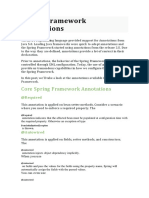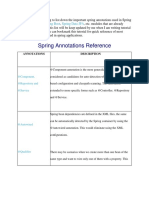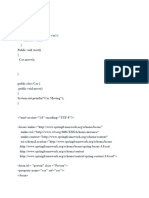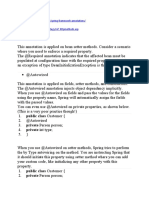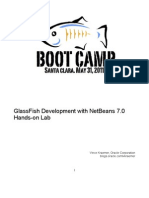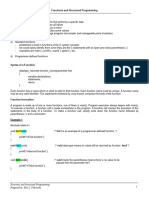Piseth Java School
1- Defining injection point by using @Autowire annotation
The annotation @Autowired can be used to declare an injection point.
In other words, this annotation instructs the Spring container to find a registered bean of
the same type as of the annotated type and perform dependency injection.
Example
@Autowired can be used at various places. Following example shows how to use it on a
field.
public class GreetingService {
public String getGreeting(String name) {
return "Hi there, " + name;
Using @Autowired
public class Greeter {
@Autowired
private GreetingService greetingService;
public void showGreeting(String name) {
System.out.println(greetingService.getGreeting(name));
1
�Piseth Java School
Defining beans and running the example application
@Configuration
public class AppRunner {
@Bean
public GreetingService greetingService() {
return new GreetingService();
@Bean
public Greeter greeter() {
return new Greeter();
public static void main(String... strings) {
AnnotationConfigApplicationContext context = new
AnnotationConfigApplicationContext(AppRunner.class);
Greeter greeter = context.getBean(Greeter.class);
greeter.showGreeting("Piseth");
Output: Hi there, Piseth
@Autowire can also be used on setters , constructors and to any methods having
multiple arguments.
2
�Piseth Java School
2 - Defining Injection point by using @Inject annotation
JSR 330's javax.inject.@Inject annotation can be used in place of Spring's @Autowired
annotation.
Starting with Spring 3.0, Spring offers support for JSR 330 standard annotations
(Dependency Injection). Those annotations are scanned in the same way as the Spring
annotations.
Example
public class GreetingService {
public String getGreeting(String name) {
return "Hi there, " + name;
Using @Inject annotation
public class Greeter {
@Inject
private GreetingService greetingService;
public void showGreeting(String name){
System.out.println(greetingService.getGreeting(name));
3
�Piseth Java School
Defining beans and running the example app
@Configuration
public class AppRunner {
@Bean
public GreetingService greetingService() {
return new GreetingService();
@Bean
public Greeter greeter() {
return new Greeter();
public static void main(String... strings) {
AnnotationConfigApplicationContext context = new
AnnotationConfigApplicationContext(AppRunner.class);
Greeter greeter = context.getBean(Greeter.class);
greeter.showGreeting("Piseth");
Output: Hi there, Piseth
4
�Piseth Java School
3 - Using @Autowired annotation on arbitrary methods
@Autowired annotation can be used on the methods with arbitrary names and multiple
arguments:
@Autowired
public void configure(GreetingService greetingService, LocalDateTime appStartTime) {
....
Example
public class GreetingService {
public String getGreeting(String name) {
return "Hi there, " + name;
Using @Autowired at arbitrary methods
public class Greeter {
private String greetingFormat;
@Autowired
public void configure(GreetingService greetingService, LocalDateTime appServiceTime) {
greetingFormat = String.format("%s. This app is running since: %s%n",
greetingService.getGreeting("<NAME>"),
appServiceTime.format(DateTimeFormatter.ofPattern("YYYY-MMM-d")));
5
�Piseth Java School
public void showGreeting(String name) {
System.out.printf(greetingFormat.replaceAll("<NAME>", name));
Defining beans and running the example
@Configuration
public class AppRunner {
@Bean
public GreetingService greetingService() {
return new GreetingService();
@Bean
public LocalDateTime appServiceTime() {
return LocalDate.of(2022, 7, 17).atStartOfDay();
@Bean
public Greeter greeter() {
return new Greeter();
6
�Piseth Java School
public static void main(String... strings) {
AnnotationConfigApplicationContext context = new
AnnotationConfigApplicationContext(AppRunner.class);
Greeter greeter = context.getBean(Greeter.class);
greeter.showGreeting("Piseth");
Output
Hi there, Piseth. This app is running since: 2022-July-17




